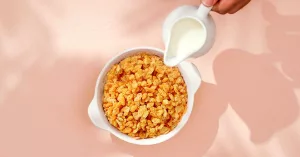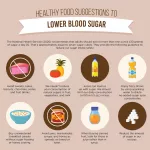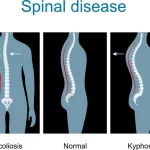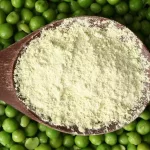Ever woken up after a late-night cheese binge feeling like you just lived through a Shakespearean tragedy? You’re not crazy. Turns out, Your gut might be party-crashing your dreams.
For years, the idea that dairy messes with sleep felt like folklore passed down through family kitchens. “Don’t eat cheese before bed!” But science is catching up. A 2025 study of 1,082 students found 20% blamed dairy for sleep disruptions. And here’s the kicker: lactose intolerance wasn’t just bloating—it tripling nightmare frequency for some.
Still, let’s not crown milk as villain yet. Because dairy’s got a secret weapon: protein content that could actually ease you into dreamland. Confused? Yeah, I was too. Let’s unpack this together.
Dairy’s split personality
You ever picture milk as a friendly tour guide for your circadian rhythm? The kind that descends from the sky with melatonin blueprints tucked under its wing? Deep down, dairy’s got…wait for it…ingredients that could make your shut-eye better.
The sleepy compound hiding in your cheese
Milk, yogurt, and yes—even cheese contain a special amino acid: tryptophan. You know, the stuff in turkey that puts you into post-Thanksgiving inactive mode. But here’s where it gets interesting.
Tryptophan is like your brain’s nighttime bouncer. Let me explain. This compound gets turned into serotonin (that happy, chill neurotransmitter we all need) and then into melatonin—the sleep hormone. No crash, no buzz…just a steady letdown for bedtime.
A 2023 PubMed study gathered data from population-wide research showing people who regularly consume dairy tend to report slightly better sleep quality. Key word: “slightly.”
So why does cheese feel different?
Hold up. There’s a reason we’ve heard “stomach pain = nightmare fuel” since Dickens’ day. Hard cheeses, in particular, are like building materials for digestion. Super dense fat. Packed protein. Not exactly what your slowing nighttime system wants to process, right?
If you’re lactose intolerant, your body’s throwing up its hands at those midnight blue cheese cravings. The Canadian study found people with diagnosed issues “reported nightmares twice as often” as non-intolerant participants. And those dreams weren’t vague collections of faces—more like haunted circus acts.
Logic check: Could all this your-body-screaming-at-0.30am thing affect sleep cycles enough to create dreams? Possibly.
Real talk from REM cycles
Let’s get spooky for a minute. Here’s what happens when you eat.After 8PM. Your digestion goes from casual to:
- Backyard bonfire
- Belly bubbling prose
- Brain getting unhelpful stories unprompted
Your digestion’s 5-star nightmare system
Think about this: scientists figured out bloating and digestion issues during sleep could actually trap your brain in a “lighter sleep zone”. You’ve heard of waking up from a nightmare? How about waking up into one because your most recent snack turned into a stomach rollercoaster?
Stage-by-stage breakdown:
| Night phase | Digestion stress | Dream reality |
|---|---|---|
| 10 PM digesting | Normal processing | Falling asleep without issue |
| 12 AM with dairy | Bloat, cramps | Remembering dreams you wish you could forget |
| 1 AM intense digestion | Serotonin redirected | Gut fluttering = anxious plots = next-day foggy brain |
Making this visual: One person enjoying ricotta pasta at 8 PM? Sleeps like a rock. Another chowing down on Parmesan at night? Waking up in cold sweats thanks to the Gut Express—total digestive chaos in the emergency zone.
- Dairy = longer digestion
- Nighttime digestion = fight between serotonin and cortisol
- Dream weirdness = fallout
Not all dairy products are created equal
Cheese is like driving through a sleep zone at 80 mph
Want to test this yourself? Keep a 3-day challenge next time:
- Tuesday: °F fromage on crackers before bed
- Wednesday: Milk with honey (then brushed teeth!)
- Thursday: Swap dairy with banana + nut butter
If you notice Wednesday went smoother than Tuesday, that warm milk tale isn’t just your grandmother’s stories—it’s science-chaperoned bedtime routine.
Yogurt: The gray card
Wait a sec—Greek yogurt lingered on investigators’ radar. While its probiotics might balance gut muscles during digestion, the fat content in full-fat versions? Still rigid 80-minute digestion affairs.
But I’ll cut yogurt slack. Because fermented dairy (like kefir or sugar-free bites) seems to hang around in stomachs more like gentle shower, not likeNashville crowd surf on a Monday night. So it’s not all bad—unless you’re diving into 18% milk fat Silk.
Milk at midnight: real story or digestion detours?
Pop quiz: does this story fit in your world?
- Met tryptophan in morning oatmeal? Focused day
- Shoveled pile of cheddar into midnight charcuterie board? Haunted night
That FirstPost analysis I read recently said digestion is like “running through wet sand at night.” Makes sense, right? We’re physiologically built for digestion during daytime—dehydration and acid production drop at night.
Milk in small quantities earlier in the evening might even give your brain a “pull up a blanket” moment—as long as you’re not super sensitive to even low-lactose options. But chugging a mountain of cold milk? Digestive stress. Thick as fog after 5 PM.
Gut talk and brainlink data
Let’s introduce… the discomfort-dream loop
Here’s your body: 01:13 AM. REM cycle trying to control dream narratives. And then… your gut starts jolting messages about undigested Brie and stomach turbulence.
These signals don’t just make dreams weird—they can redirect your brain into latex mode horror content. A Frontiers in Psychology report tied cortisol spikes from digestive issues to mood swings in dream content. Translation: food distress = dream garbage fire.
Pat yourself + your gut on the back:
Want to play detective?
- Track your dairy intake over 10 nights.
- Journal waking events AND specific symptoms (gas/bloat).
- Note dream intensity and recall—colorful anyone?
What’s fixable + what’s flour-based myth
Here’s the golden rule about your food-diary experiment: digestion vs. dream content matters more than the dairy itself. Could be you and your gut have a long-term feud with A1-beta-casein proteins—not cheese demon.
If eliminating dairy solves it? Cool. But if grilled cheese didn’t actually trip anything up, you’re off the hook. Ask yourself: Did I eat a lactose time bomb? Or was it just life chunk? Stress, screens, etc.
Is the warm milk myth making an unscheduled exit?
Remember when warm milk was bedtime cannon? Here’s the setback: tryptophan does no solo act in milk. Needs a carb-powered entourage (think honey or lightly sweetened grains) to cross brain barriers and start building melatonin.
So if milk only breaks even on nourishment, but adds that “mental warmth” at 10 PM (when digestion still cooperates)? Worth the tradition—for some of us anyway.
Stop when your gut says STOP
I’ve said it once, I’ll repeat it tenfold: not all bloating happens in concert with actual lactose sensitivity. Could be stressed brain sparking placebo paranoia around dairy. But if you’ve got hard data of lactose issues—even “partially“—consider slow experiments before dramatic life shifts.
Try baked ricotta pasta two hours before mattress instead of 12 AM cold cuts. Dream diaries complete with emotional reaction scale. Then you’ll know.
Final thoughts
We’ve flipped this dairy tome inside out, haven’t we? Tryptophan—good. Late-night cheese—get “faint reappearance of Marley’s ghost” dreams for some. Gut reactions—sleep-wrecking fire of their own. And yet, there’s still a warm milk legacy hanging in there like that quiet neighbor who helps during fires.
Final conclusion: your gut runs a personal lab for this experiment. Doesn’t need to go vegan or nut milk. You just need:
- Dream journal
- 3-hour rule pre-bed
- Lactose lit checks (if relevant)
The “ban dairy” debate isn’t so cut and dried. The right timing, quality, and gut understanding could mean midnight snacks and sweet z’s coexist…
But if you’re waking up literally sweating over dreamgram content week after week? Let’s talk timing, cheese types, and gut soldiers. You might find tomorrow’s dreams begin in your dinner plate—and not the one you shoveled at 12 AM. Want to write a case study? Leave the instances in the comments below.

























Leave a Reply
You must be logged in to post a comment.